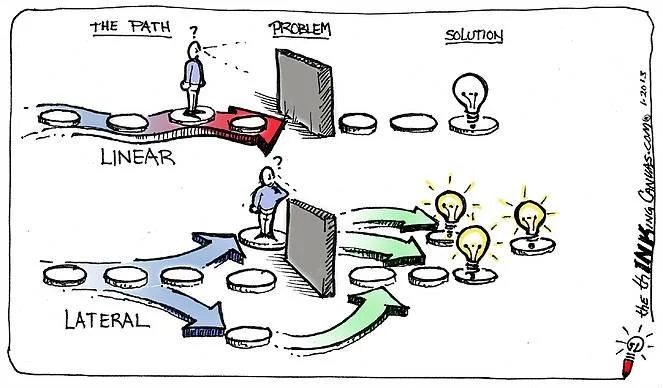42 Truths About Creativity - Part 2
“Ideas won’t keep; something must be done about them. ”
The word ‘creativity’ means lots of things to different people.
Inspired by the excellent book, The Creative Act: A Way of Being, by the acclaimed music producer Rick Rubin, we had a go at writing down forty-two of our own ‘truths’ about creativity and the creative process.
You can catch up here if you missed Part 1 of this series.
We hope you find the list helpful.
22. It’s about making the familiar seem unfamiliar
Every new idea is simply a remix of existing ideas. Nothing is truly original. The talent comes in using what’s already there and putting a new twist on it.
23. It requires curation
Fill your mind with high-quality ideas. Don’t let any old rubbish in. Be ready to discard the elements you no longer like. And be discerning about which ideas are worth investing in.
24. It involves tapping the unconscious
The best ideas come when you’re not trying. You have to let your unconscious mind do the work. Be patient until the answers bubble up to the surface.
25. It necessitates a beginner’s mindset
Often it takes an outsider to solve a difficult challenge. Why? Because they don’t know the ‘rules’ of the system. In all creative projects, you must imagine yourself as a child seeing things for the first time.
26. It requires a safe place
Nobody ever came up with a good idea while being chased by a tiger. Overwhelming fear is not conducive to the free flow of ideas. You need to create in an environment that makes you feel safe.
27. It has no secrets or shortcuts
The things that are worth doing in life take time. They’re also difficult. Remember, there are no shortcuts or silver bullets to creative success. You have to put in the work and follow the path no matter the twists and turns.
28. It requires you to be relentlessly unsatisfied
Creativity has no endpoint. Your ideas are never complete. They’re just a stepping-off point for your next idea. The moment you let your ego get carried away is when your work starts to suffer. It becomes stale and repetitive.
29. It’s fueled by curiosity
Your curiosity is your greatest compass. Follow it wherever it takes you. There are no right or wrong answers; anything is interesting if you look hard enough. Never stop asking questions, no matter how trivial they may seem.
30. It becomes valuable through action
Lots of people have great ideas. Few make them a reality. Others will only admire your ideas after you have made them concrete. Starting is the hardest part, but the rest will flow once you do.
31. It won’t sell itself
There is an endless stream of content vying for peoples’ attention. This means you must work hard to get noticed. Creating brilliant work is not sufficient. You also have to promote yourself.
32. It’s hard
Humans are hardwired to be lazy. We like others to do the work for us. So it’s easier to read someone else's book than to face the challenge of writing one ourselves.
33. It requires extreme persistence
Creativity can be challenging, and persisting despite obstacles or creative blocks is important. Keep pushing forward and experimenting with different approaches.
34. It thrives on diverse experiences
Engaging in diverse activities, exploring new environments, and learning about different cultures broaden your perspective and feed your creative thinking.
35. It’s about embracing ambiguity
The beginning and middle of any creative project is ambiguous. You can’t be sure of the outcome. By getting comfortable with uncertainty and embracing the grey areas, you open your mind to more imaginative thinking.
36. It benefits from holding more than one idea in mind at once
Multitasking is a myth. The brain can only focus properly on one thing at a time. However, sometimes it gets stuck. Switching to a different project gives the unconscious mind time to solve it.
37. It requires a strong self-belief
Trusting in your creative abilities and having confidence in your ideas is essential for taking risks and pursuing innovative paths. It’s what carries you through the challenging parts of your journey.
38. It necessitates embracing failure
A creative mind views failure as a chance to learn and improve rather than a definitive setback. Mistakes are the stepping stone to creative success.
39. It’s a legal unfair advantage
Being creative is a superpower that gives you the edge and allows small teams to outwit larger ones. The great adman Bill Burnbach once said, “Creativity may well be the last legal unfair advantage we can take over the competition.”
40. It’s never static
Creativity does not reward those that stay still. The greatest artists have a talent for reinvention. They explore new ways of doing things and never rest on their laurels.
41. It thrives in times of crisis
Necessity is the mother of invention. When you lack the resources required, you must find alternatives, which involves thinking creatively.
42. It’s a lifelong journey
The life of a creative person is one of continuous learning and exploration. You are constantly evolving, and there is no finish line.
If you found the above helpful, you’ll love our Creative Thinking Course. Made in collaboration with some of the world’s greatest creative minds and certified by Cannes Lions, it's packed with practical tools and tips to help unlock your creative potential.






